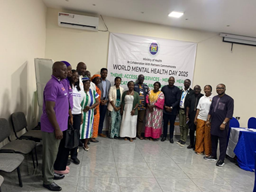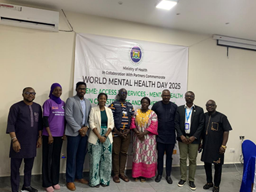By Kadiatu Sankoh
On October 10, 2025, Ministry of Health, in collaboration with the World Health Organization (WHO), The Carter Center, Humanity and Inclusion (HI), AFD, Partners in Health, and the Mental Health Champion Network Sierra Leone, commemorated World Mental Health Day 2025 at the New Brookfields Hotel in Freetown. The global theme for this year’s observance: “Access to Services: Mental Health in Catastrophes and Emergencies” — underscores the urgent need to strengthen mental health systems, particularly during crises.
Speaking on behalf of the Ministry of Health, a representative emphasized the significance of the day in raising awareness about mental illness and its impact on individuals and communities. The representative noted that the occasion provides an opportunity for the Ministry and mental health practitioners to discuss achievements and challenges in improving mental health care across Sierra Leone.


They further called on individuals and communities to create supportive environments, where people with mental health conditions can access essential care and services without stigma or discrimination.
Deputy Minister of Health II, Dr. Jalikatu Mustapha, highlighted Sierra Leone’s progress and ongoing challenges in mental health care. She emphasized that mental health affects everyone, either directly or indirectly, and that collective advocacy is vital for sustainable change.
Dr. Mustapha noted that millions of people globally live with mental health conditions, a trend mirrored in Sierra Leone with less than 10% accessing adequate care. She cited multiple national crises, including the civil war, Ebola, COVID-19, the mudslide, and the ongoing drug abuse epidemic, as major contributors to widespread trauma and psychological distress.
She announced key initiatives by the Ministry, including:
- Establishing mental health units in all hospitals nationwide.
- Training over 500 health workers in basic mental health care.
- Launching a national mental health helpline.
- Creating the Mental Health Champions Network for advocacy and anti-stigma efforts.
- Developing a new Mental Health Bill to replace the outdated 1902 Lunacy Act, currently before Parliament.
- Training specialists, including psychiatrists, psychiatric nurses, and addiction professionals, within Sierra Leone.
- Updating the Mental Health Policy and Strategic Plan (2023–2030).
- Working toward integrating mental health care into the forthcoming National Health Insurance Scheme.
Dr. Mustapha emphasized that mental health is not solely the responsibility of the Ministry of Health, but requires a multisectoral approach involving education, social welfare, justice, security, and the media. “When we prioritize mental health, we prioritize national well-being, productivity, and development,” she said.
Fredson Kuti-George, Health Promotion Officer at the WHO, reaffirmed the organization’s commitment to supporting Sierra Leone’s mental health sector. He underscored that mental health is fundamental to overall well-being and that “there is no health without mental health.”
He described the proposed Mental Health Bill as a transformative step aligning with international standards and human rights principles, a move to replace colonial-era legislation with a framework that safeguards dignity and rights.
Mr. Kuti-George noted that only 2% of individuals with severe mental illness in Sierra Leone currently receive proper care, citing limited infrastructure, outdated laws, and workforce shortages. He also highlighted the growing concern over substance abuse among youths and called for expanded rehabilitation and prevention services.
“Let us use this day not only to reflect but to act,” he urged. “Together, we can build a Sierra Leone where mental health is protected and promoted.”
Dr. Christopher, Program Manager for Public Health Emergency Preparedness and Response at the National Public Health Agency (NPHA), outlined the agency’s role in coordinating emergency health responses under the Public Health Act of 2022.
He emphasized the need to embed mental health and psychosocial support services within emergency response systems, noting that “mental health access during emergencies is critical, as one in five people experience mental health challenges in crisis settings. “The NPHA plans to:
Train first responders in psychological first aid.
Develop rapid-response mental health teams.
Integrate community-based mental health models involving local leaders and faith groups.
Ensure continuity of care during crises by linking emergency and routine health services.
Dr. Christopher expressed the agency’s determination to make Sierra Leone the 12th African country to formally integrate mental health into public health emergency protocols.
Benedict Dossen, Mental Health Technical Lead for The Carter Center in Africa, announced a new two-year initiative supported by the U.S. government and the Ministry of Health. The project will focus on:
- Reforming policies and strategies to close gaps in youth mental health.
- Supporting the passage of the new Mental Health Bill.
- Conducting financing studies to guide investment in mental health services.
- Strengthening advocacy through the Youth Mental Health Champions Network.
Mr. Dossen reaffirmed The Carter Center’s commitment to being an active partner in strengthening Sierra Leone’s mental health systems and ensuring no one is left behind.